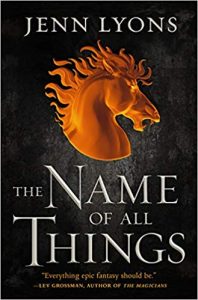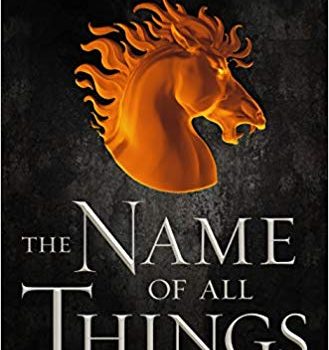Liz Bourke Reviews The Name of All Things by Jenn Lyons
 The Name of All Things, Jenn Lyons (Tor 978-1-250-17553-3, $26.99, 592pp, hc) October 2019. Cover by Lars Grant-West.
The Name of All Things, Jenn Lyons (Tor 978-1-250-17553-3, $26.99, 592pp, hc) October 2019. Cover by Lars Grant-West.
I read Jenn Lyons’ debut, The Ruin of Kings, around the time it was published in early 2019. It’s a brick of a book – traditional, for epic fantasy, in terms of its size. Even if it proceeded to make several rather less-traditional choices in its worldbuilding, structure, and characters, The Ruin of Kings still hewed pretty closely to a straightforward “there is an epic threat to the survival of the world, and the main character is chosen – or at least favoured – by the gods to address it” epic fantasy presentation. Even if Kihrin, said main character, is undergoing some pretty shit life experiences. (I enjoyed it. It’s definitely worth a try.)
The Name of All Things, the second volume in the series, is also a 600-page brick. And though its primary focus is on (for the most part) different characters to The Ruin of Kings, it would be a mistake to believe it can stand alone. Where The Ruin of Kings made as if to offer its reader a reasonably straightforward epic fantasy trajectory, The Name of All Things undercuts and subverts that trajectory, making the world and the story an even richer, more complicated thing, and challenging the reader’s view of some of the first novel’s antagonists – and the motivations of its gods and demons.
Lyons has a complex, playful, and layered approach to narrative. The conceit that underlies the telling of The Name of All Things is that it is a report written by one of the novel’s antagonists, the woman Senera, to the person for whom she’s working. (There are footnotes. Senera offers some caustic sarcasm. Despite being something of a mass murderer, as a character she’s easy to like.) Within this overarching conceit, the story is told from three different and distinct perspectives. One of these perspectives is – perhaps – intended to be the view of an outside observer. It’s written from a third-person point of view, and focuses – initially at least – on Kihrin. This is the frame narrative for the story with which the majority of The Name of All Things is concerned, recounted in turns by Janel (Count Theranon) and the priest Brother Qown, acolyte of the Vishnai Mysteries.
Janel is Joratese, and Jorat is a dominion of the Empire of Quur where socially sanctioned gender roles don’t have to align with physical sexual characteristics, as they do in the rest of the empire. (The Joratese have three genders, and, horse-focused as their whole society is, they refer to these genders as “stallion,” “mare,” and “gelding.”) Though physically female, in Jorat, Janel occupies social roles that in other dominions of the empire would be reserved for people with male physical sexual characteristics. Janel also has a horrifying past and a connection with a demon that’s hunted Kihrin in his past: she survived a Hellmarch.
Qown is one of her companions, a non-Joratese pacifist. Their story begins at the point where Janel has been physically driven out of her domain as count due to local politics, though she hasn’t lost the title: circumstances find her wandering the road. In the domain of a baron she’s known from childhood, she finds abuses of power that are rare in Jorat, along with murder, demons, a dragon apparently under the control of the Duke of Yor – a man who means to undermine Jorat’s current ruler and invade – and a man called Relos Var, whom readers of The Ruin of Kings will remember as Kihrin’s enemy.
Janel’s attempts to address – and set right – these issues end up with her and Qowm as prisoners in Yor, where she’s stripped of her preternatural strength and treated as a woman (that is, according to the mores of most of the Empire of Quur, but especially in Yor, essentially male property), an experience she doesn’t particularly enjoy. She and Qowm are pieces in someone else’s game, but Janel’s not content to dance to Relos Var’s tune – even if he does always seem to be several steps ahead of her.
Prophecy means she’s on a deadline. But there’s more than one way to read prophecy, and Janel may be playing into her enemy’s hands.
Except Relos Var may not actually be her enemy. There’s a distinct question there, especially for Brother Qowm: how far will you go, to save the universe from annihilation? If you’re willing to contemplate overthrowing a slavery-condoning empire, why not the gods? They are, after all, responsible.
The Name of All Things is deft and light-footed, despite its length: well paced, and with enormously compelling characters. This second volume in Lyons’ multi-book saga queers the worldbuilding and complicates our view of the conflicts between the major players. Combined with The Ruin of Kings, it offers a tantalising structural glimpse of how Lyons might continue this series. The prophecies referred to in both The Name of All Things and The Ruin of Kings refer to four Hellwarriors, of which the reader has been introduced to two: Kihrin and Janel. The Ruin of Kings and The Name of All Things are essentially origin stories for both Kihrin and Janel, which are combined with epic happenings and prophetic ramifications in the (as it were) present day of the story. It’s reasonable to forecast that there are at least two more volumes to the story, each of which – for symmetry’s sake – is likely to follow a similar pattern.
I’m here for it.
Liz Bourke is a cranky queer person who reads books. She holds a Ph.D in Classics from Trinity College, Dublin. Her first book, Sleeping With Monsters, a collection of reviews and criticism, is out now from Aqueduct Press. Find her at her blog, her Patreon, or Twitter. She supports the work of the Irish Refugee Council and the Abortion Rights Campaign.
This review and more like it in the January 2020 issue of Locus.
 While you are here, please take a moment to support Locus with a one-time or recurring donation. We rely on reader donations to keep the magazine and site going, and would like to keep the site paywall free, but WE NEED YOUR FINANCIAL SUPPORT to continue quality coverage of the science fiction and fantasy field.
While you are here, please take a moment to support Locus with a one-time or recurring donation. We rely on reader donations to keep the magazine and site going, and would like to keep the site paywall free, but WE NEED YOUR FINANCIAL SUPPORT to continue quality coverage of the science fiction and fantasy field.






